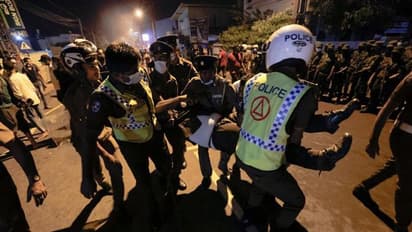Sri Lanka imposes state of emergency amid its worst economic crisis in decades

Synopsis
Sri Lanka is going through its worst economic crisis in decades and on Thursday (March 31), protests against the government’s handling of the situation turned violent, with the police imposing an overnight curfew in the capital Colombo.
Sri Lanka is in the midst of a major economic crisis and a nationwide state of emergency has been declared by President Gotabaya Rajapaksa, a day after protestors tried to storm his home in Colombo city.
President Gotabaya Rajapaksa invoked the tough laws allowing the military to arrest and detain suspects for long periods without trial as demonstrations calling for his ouster spread across the South Asian nation.
Sri Lanka is going through its worst economic crisis in decades and on Thursday (March 31), protests against the government’s handling of the situation turned violent, with the police imposing an overnight curfew in the capital Colombo.
President Gotabaya issued the gazette under the Public Security Ordinance, which gives him power to make regulations “in the interests of public security, the protection of public order and the maintenance of supplies and services essential to the life of the community”.
Under the emergency regulations, the President can authorise detentions, taking possession of any property and search any premises. He can also change or suspend any law.
The Sri Lankan government on Friday termed the violent demonstration near Rajapaksa’s residence as “an act of terrorism” and blamed “extremist elements” linked to opposition parties for the incident.
“It has been revealed that a group of organised extremists were protesting near the Jubilee Post in Nugegoda, suddenly became riotous and turned violent,” the statement said.
“Many of those involved in the incident have been arrested and many have been found to have been organised extremists,” it added.
Rajapaksa’s office said Friday that the protesters wanted to create an “Arab Spring” — a reference to anti-government protests in response to corruption and economic stagnation that gripped the Middle East over a decade ago. “The Thursday night protest was led by extremist forces calling for an Arab Spring to create instability in our country,” the President’s office said in a brief statement.
The economic crisis is caused in part by a lack of foreign currency, which is used to pay for fuel imports. Faced with power cuts lasting half a day or more, and a lack of fuel and essential food and medicines, public anger has reached a new high in the island nation of 22 million.
The country had declared an economic emergency in August. Sri Lankans are now facing shortages of milk powder, cooking gas, kerosene and other essential items.
Check the Breaking News Today and Latest News from across India and around the world. Stay updated with the latest World News and global developments from politics to economy and current affairs. Get in-depth coverage of China News, Europe News, Pakistan News, and South Asia News, along with top headlines from the UK and US. Follow expert analysis, international trends, and breaking updates from around the globe. Download the Asianet News Official App from the Android Play Store and iPhone App Store for accurate and timely news updates anytime, anywhere.